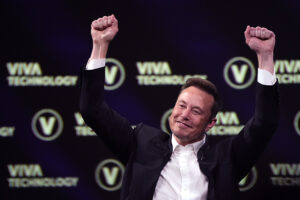
(Photo by Nathan Laine/Bloomberg via Getty Images)
Advertisers have fled Twitter ever since Elon Musk changed its name to “X” and watched n-word usage crank up to 11. As it turns out, corporate America is squeamish about throwing millions toward a bulletin board that can’t guarantee their brand doesn’t end up plastered next to Nazi fan letters. Who woulda thunk?
Musk’s response was to tell these advertisers they should “go fuck yourself” and when that charm campaign failed to deliver ad revenue… he sued.
This morning, X filed a lawsuit in the Northern District of Texas, claiming that advertisers violated the Sherman Antitrust Act when they chose to take their ad dollars to platforms that aren’t hemorrhaging users or putting brands next to Great Replacement Theory Fanfic.
As Musk put it “We tried peace for 2 years, now it is war.” Apparently “go fuck yourself” was the peace stage.
In an “Open Letter to Advertisers,” X CEO Linda Yaccarino explained that the company once content to tell its sponsors to fornicate with themselves now feels compelled to take those clients — who belong to a trade group with an initiative called GARM — to court because…
As [Jim Jordan’s Committee] report found: “Evidence obtained by the Committee shows that GARM and its members directly organized boycotts and used other indirect tactics to target disfavored platforms, content creators, and news organizations in an effort to demonetize and, in effect, limit certain choices for consumers.”
The consequence – perhaps the intent – of this boycott was to seek to deprive X’s users, be they sports fans, gamers, journalists, activists, parents or political and corporate leaders, of the Global Town Square.
Ahem. YOU ARE NOT THE GLOBAL TOWN SQUARE. You’re a private company shilling for bucks from the customers you lost when you transformed your product to dogshit.
These are business decisions made by private companies exercising free market judgment. That they voluntarily joined a trade group that developed professional standards for its members doesn’t make it any less a business decision.
Even if Musk could successfully establish that his advertisers were engaged in a purely political boycott, NAACP v. Claiborne Hardware Co. established the First Amendment right to engage in a politically motivated boycott. While the right to boycott has faced some headwinds at the circuit level, the Supreme Court hasn’t disturbed Claiborne yet.
What “free speech absolutist” Elon Musk seeks in this case is to square-peg-round-hole antitrust law to make the government compel private actors to endorse him with money. It’s the opposite of free speech.
No serious legal mind thinks this is how free speech works, which is why Jonathan Turley is one of the foremost proponents of this theory. Turley has suggested that some advertisers are so rich that, if they refuse to advertise, they effectively silence speech. It’s a theory that makes no sense in the global economy that actually exists in 2024, where no group of entities holds anything close to market dominance over advertising spend. Indeed, X still has advertisers and still makes money… it just doesn’t make as much money as other platforms doing a much better job of appealing to sponsors. If Musk wants to run a charity case for Nazis, he can suck it up and embrace slimmer profits.
Of COURSE advertisers can choose where to spend their money and can’t be forced to endorse viewpoints they don’t agree with. As we explained at the time:
What would happen, in Turley’s mind, if the shoe were on the other foot? If a company like Disney speaks out against Florida’s “Don’t Say Gay” law, must companies like Hobby Lobby or Chick-fil-A be forced to do business with them? Turley’s framework seems to say yes, though it’s hard to imagine he would actually take that stance.
We actually know what happens when the shoe is on the other foot: Turley openly celebrates retaliation against those viewpoints because he’s a clown.
But X brought this antitrust gibberish into the Northern District of Texas. Or more accurately, what it brought through partisan forum shopping into a 1 in 1 chance of appearing in front of Judge Reed O’Connor, a judge who’s not above manufacturing pure argle-bargle to help out right-wing patrons. That he might transform antitrust into a justification for compelled speech is troublingly not an impossibility.
Note that Musk’s lawyers from Quinn Emanuel aren’t touching this one. Instead, the billionaire opted for anti-lockdown/masking lawyer Harmeet Dhillon to give you a sense of where this case finds itself on the goofball meter.
Though at least Dhillon confined herself to antitrust. Her client could not.

Criminal RICO.
These are not serious people.
 Joe Patrice is a senior editor at Above the Law and co-host of Thinking Like A Lawyer. Feel free to email any tips, questions, or comments. Follow him on Twitter if you’re interested in law, politics, and a healthy dose of college sports news. Joe also serves as a Managing Director at RPN Executive Search.
Joe Patrice is a senior editor at Above the Law and co-host of Thinking Like A Lawyer. Feel free to email any tips, questions, or comments. Follow him on Twitter if you’re interested in law, politics, and a healthy dose of college sports news. Joe also serves as a Managing Director at RPN Executive Search.






